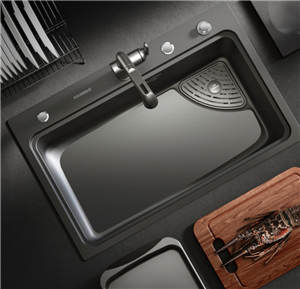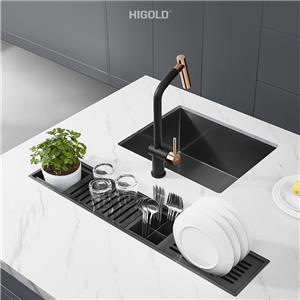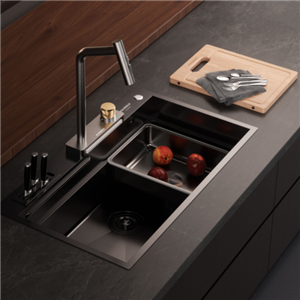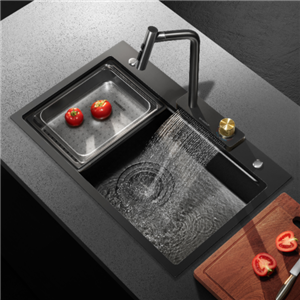What is the best material for a kitchen sink?
The kitchen sink is an indispensable and important part of the kitchen, used for daily tasks such as washing dishes, handling food, and draining. As a high-frequency kitchen equipment, the material of the sink has a decisive influence on its durability, cleaning convenience, aesthetics, and user experience. During the decoration process, people often ask: What is the best material for a kitchen sink?
There are many types of kitchen sinks on the market, from stainless steel to ceramics, from composite materials to granite, and each material has its own advantages and applicable scenarios. To answer this question, we need to conduct a comprehensive analysis from multiple angles such as durability, cleaning convenience, anti-fouling ability, cost, and installation requirements.
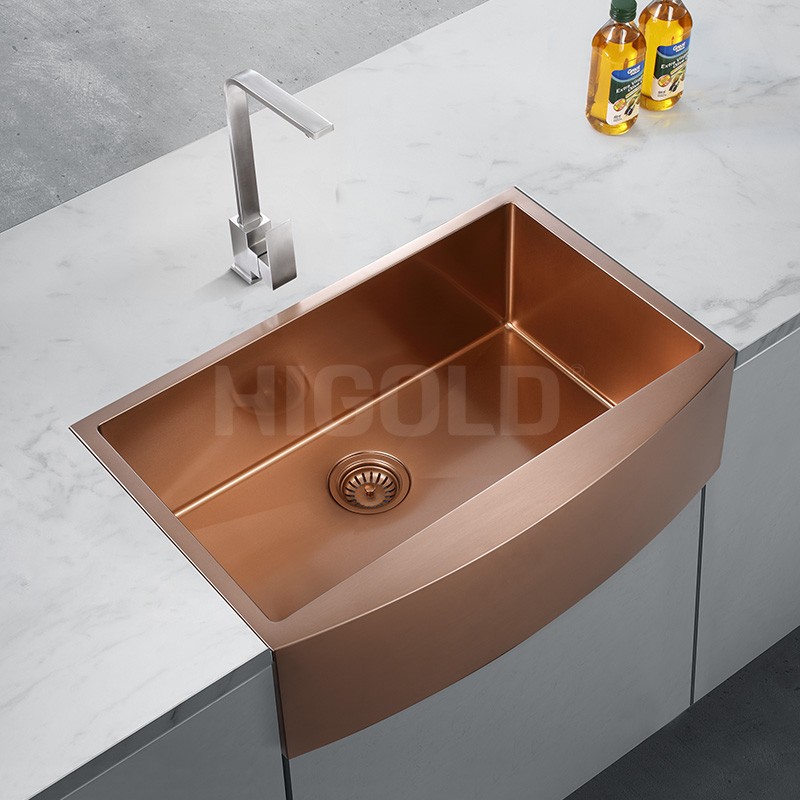
What are the common kitchen sink materials?
1. Stainless steel sink
Stainless steel is one of the most common and popular kitchen sink materials, especially in modern home and commercial kitchens. High-quality stainless steel sinks usually use 304 or 316 grades of stainless steel, which contain a higher proportion of chromium and nickel and have strong corrosion resistance.
Advantages of stainless steel sinks:
● Strong durability: Stainless steel sinks have extremely strong impact resistance and wear resistance, suitable for high-frequency use.
● Rust and corrosion resistance: High-quality stainless steel can effectively resist rust in humid environments.
● Lightweight and easy to install: Stainless steel is relatively light in weight, easy to install, and suitable for a variety of countertop designs.
● Reasonable price: Compared with other high-end materials, stainless steel is more affordable.
● Adapt to a variety of styles: The gloss of stainless steel is suitable for modern kitchens, combining practicality and beauty.
Disadvantages of stainless steel sinks:
● Easy to scratch: Scratches are prone to appear during use, affecting the appearance.
● Noise problem: Thinner stainless steel sinks are prone to produce larger water flow noise, but some high-end products solve this problem by adding bottom sound insulation pads.
2. Ceramic sinks
Ceramic sinks have become the choice of many families with their classic appearance and smooth surface, especially suitable for traditional and country-style kitchens. They are made of high-temperature fired ceramics and covered with a waterproof glaze layer.
Advantages of ceramic sinks:
● Beautiful and generous: The gloss and texture of ceramic sinks are very attractive, enhancing the overall grade of the kitchen.
● Easy to clean: The surface is smooth and not easy to absorb stains, and can be cleaned with a simple wipe.
● High temperature resistance: Ceramic materials can withstand high temperatures and will not be damaged by hot water or hot pots.
Disadvantages of ceramic sinks:
● Fragility: Although ceramic sinks are hard, they have poor impact resistance and may break if heavy objects fall.
Heavy weight: Ceramic sinks are heavy, and the load-bearing requirements for countertops and cabinets are high during installation.
3. Granite composite sinks
Granite composite sinks are a modern high-tech material. They are made of a mixture of natural granite powder and resin, combining the appearance of natural stone with the practicality of composite materials.
Advantages of granite composite sinks:
● Strong and durable: This material has extremely high hardness and can resist scratches and impacts.
● Good anti-fouling performance: The surface is not easy to absorb dirt and scale, and it is easy to clean.
● Multiple color options: Granite composite materials are available in a variety of colors and textures, suitable for kitchens of different styles.
● Anti-noise: The material has a high density and can effectively reduce water flow noise.
Disadvantages of granite composite sinks:
● High cost: The price of granite composite sinks is usually higher than that of stainless steel sinks.
● Complex installation: Due to its heavy weight, installation requires professional technical support.
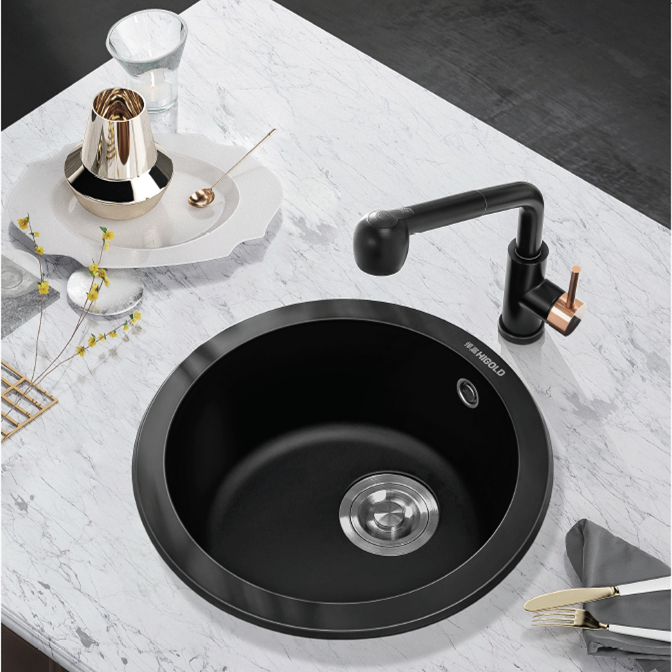
4. Cast iron sinks
Cast iron sinks are made of cast iron material and covered with a layer of enamel. They are often seen in traditional-style kitchens and are elegant and durable.
Advantages of cast iron sinks:
● Durability: Cast iron sinks are very strong and have a long service life.
● Classic appearance: The smooth glaze and retro texture make cast iron sinks attractive.
● Anti-fouling ability: The glaze is smooth, not easy to stain, and easy to clean.
Disadvantages of cast iron sinks:
● Heavy weight: Cast iron sinks are very heavy and require a strong support structure for installation.
● Easy to crack: The glaze may crack due to heavy impact or long-term use.
● High cost: Cast iron sinks are expensive, especially high-quality products.
5. Composite sinks
Composite sinks are made of a mixture of various synthetic materials, usually combining quartz, resin and fiberglass, with high hardness and excellent durability.
Advantages of composite sinks:
● High versatility: excellent impact resistance, stain resistance and heat resistance.
● Diverse appearance: a wide range of colors and styles are available.
● Easy to clean: water stains and stains are not easy to remain on the surface, and it is easy to clean.
Disadvantages of composite sinks:
● Complex installation: heavy weight and special materials require professional installation.
● High price: The price of composite sinks is generally higher than that of stainless steel sinks.
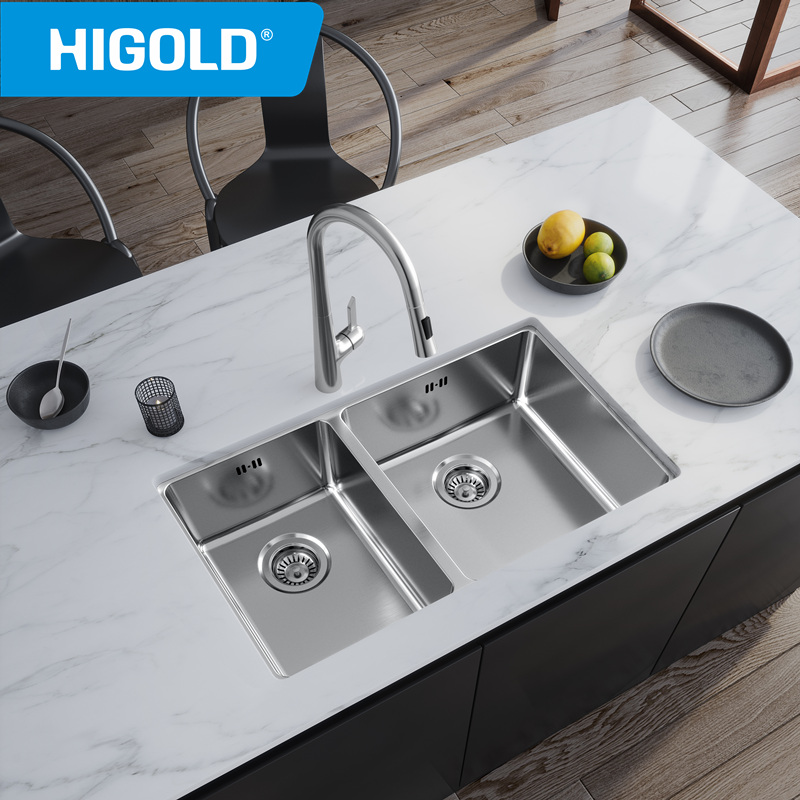
How to choose the right sink material for you?
1. Choose according to the style of the kitchen
Sinks of different materials have obvious differences in appearance. For example, stainless steel sinks are more suitable for modern and simple kitchens, while ceramic and cast iron sinks are more suitable for traditional or country styles. Granite composite materials can be matched with a variety of styles and are suitable for families who like personalized design.
2. Choose according to frequency of use and functional requirements
If the kitchen is used frequently and needs to withstand a lot of cleaning tasks, stainless steel sinks are the best choice. They are durable and not easy to damage. If you pay more attention to beauty and design, you can choose ceramic or granite composite sinks.
3. Choose according to budget
Stainless steel sinks are usually more affordable and suitable for families with limited budgets. Cast iron, ceramic and composite sinks are more expensive and suitable for users who pursue high-end quality.
4. Choose according to maintenance convenience
Stainless steel and composite sinks are the easiest to clean and are suitable for families who value convenient cleaning. Although ceramic sinks are easy to clean, you need to be careful to avoid cracking.
Application scenarios of sinks of different materials
● Stainless steel sinks: suitable for families with high frequency of daily use, durability and high cost performance.
● Ceramic sinks: suitable for families who pursue exquisite appearance and low frequency of kitchen use.
● Granite composite sinks: suitable for families who pursue personalized design and high performance, especially for high-end kitchen decoration.
● Cast iron sinks: suitable for retro-style kitchen decoration, but you need to consider the difficulty of installation and the load-bearing capacity of the countertop.
Which kitchen sink material is best for you?
There is no single answer to the "best material" for kitchen sinks. The final choice should be based on the following key factors:
● Budget: Stainless steel is cost-effective and suitable for most families; granite composite materials are suitable for users with sufficient budgets.
● Style preference: choose ceramic or cast iron for aesthetics, stainless steel or composite materials for practicality.
● Practical needs: stainless steel or composite materials are recommended for frequent use; ceramic or cast iron can be selected for occasional use.
By understanding the advantages and disadvantages of various materials and applicable scenarios, consumers can choose the most suitable kitchen sink material according to their personal needs and kitchen conditions, bringing both beautiful and practical solutions to the kitchen.
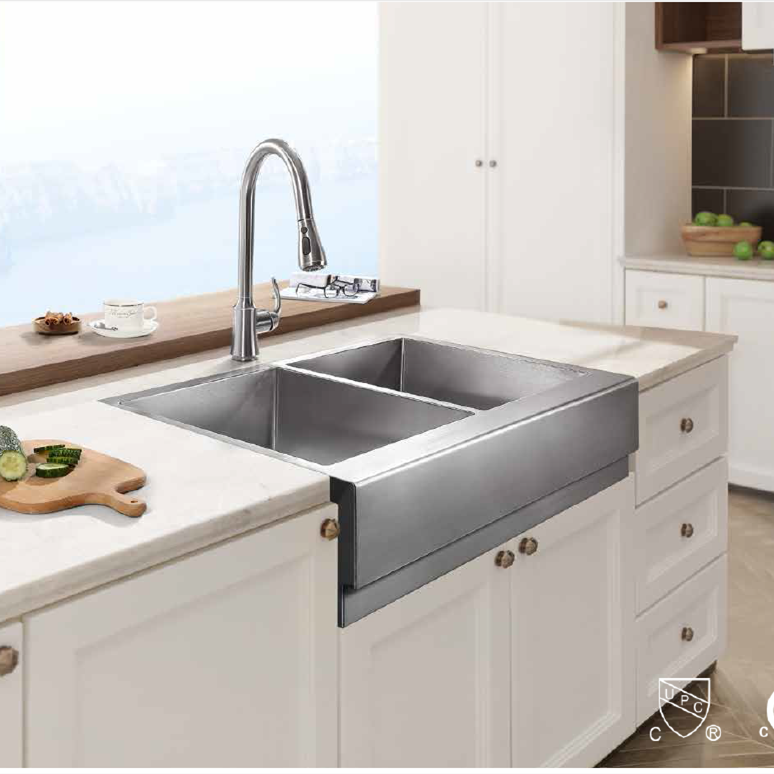
Your Go-To Supplier for Inox Kitchen Sinks
Higold Group Co., Ltd. is a renowned manufacturer of high-quality stainless steel Inox kitchen sinks and faucets. Established in 2004, we have become a leading supplier offering competitive prices for both bulk and customized orders. Our factory spans 200,000 square meters, ensuring we have the capacity to meet large-scale demands. Whether you're buying for wholesale or retail, we guarantee timely deliveries, excellent quality, and affordable prices. Our products are certified internationally, including CUPC, CSA, and CE, making us a trusted brand for kitchen hardware.

